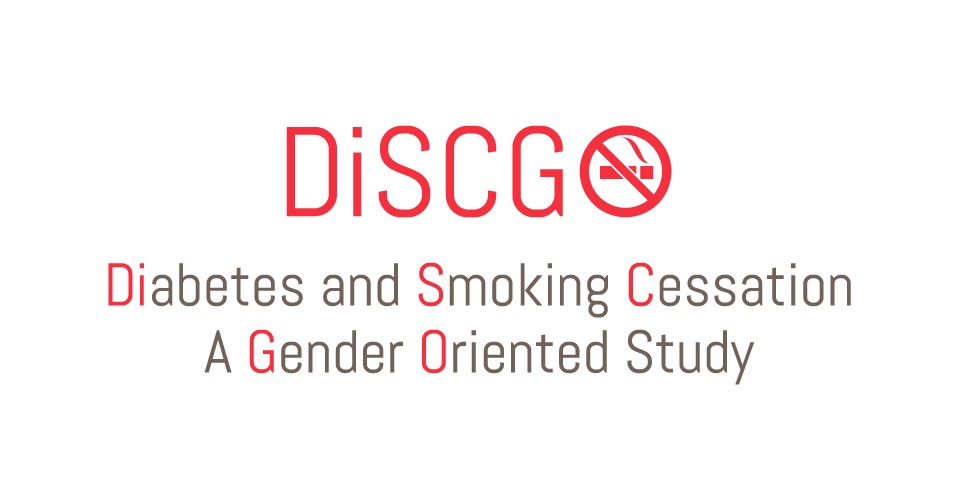10.16909-dataset-34
Assessing the efficacy and impact of a personalised smoking cessation intervention among type 2 diabetic smokers: an open label randomised controlled trial
DISCGo-RCT
| Name | Country code |
|---|---|
| Switzerland | CHE |
Objectives
The aim of this study is to assess the efficacy of a smoking cessation intervention in a population of smokers with type 2 diabetes and to measure the metabolic impact of smoking cessation.
Design
Open label randomised controlled trial
Setting
Ambulatory care population recruited from a sanitary region in Switzerland from 2018 to 2020.
Participants
48 participants were included, 19 women (39.6%) and 29 men (60.4%), their mean age was 61.8 years (SD 9.84), 28 completed the last follow-up. To be included, participants needed to speak and understand French, to be ≥ 18 years old, to have been diagnosed with type 2 diabetes and to have smoked > 100 cigarettes during their entire life and be currently smoking cigarettes. People not able to give informed consent and to follow the study procedure (due to dementia, psychological disorder, language problem), being enrolled in another smoking cessation study or program or in a multi-behavioural program that includes smoking cessation, planning to move out of Switzerland or pregnant or breastfeeding persons were excluded.
Participants were recruited from different centers, such as the ambulatory care clinic of the Center for Primary Care and Public Health (former PMU) in Lausanne and the Centre Hospitalier Universitaire Vaudois (CHUV) with patients hospitalized in medical or surgical wards. Participants were also enrolled from the diabetes/endocrinology (EDM) department of CHUV and cardiology consultations, as well as from private practices of diabetes/endocrinology specialists and general internists in the Lausanne area. Advertisements were also made on selected websites, newspapers and social networks, and recruitment also took place in pharmacies from Unisanté and from the Lausanne area.
Interventions
The intervention consisted in four individual behavioural counselling sessions over 12 weeks, conducted by trained research nurses, using motivational interviews and addressing diabetes and gender specificities. The control group had one short counselling session at baseline. Both groups had a follow-up visit at 6 and 12 months.
Primary and secondary outcome measures
The primary study outcome is continuous smoking abstinence validated by expired-air CO from week 12 to week 52. Secondary study outcomes are continuous and 7-day point-prevalence smoking abstinence at 12 and 26 weeks; change in motivation to quit and cigarette consumption; and change in HbA1c levels, body weight, waist circumference, and renal function after smoking cessation.
Results
48 participants were randomized, in the intervention (n=23) and control (n=25) groups. Follow-up rate was 77% at 3 months, 63% at 6 months and 58% at 12 months. The mean cigarettes consumption per day was 21.2 cig/d, 62.5% planned to quit, 29.2% to reduce and 8.3% did not plan to quit. All participants had type 2 diabetes, with a mean duration of 11.9 years (DS 9.77), the mean BMI was 29.0 kg/m2 (SD 4.06) and mean HbA1c 7.0% (SD 1.08). Continuous smoking abstinence from month 3 to month 6 was 4.3% (n=1) in the intervention and 4.0% (n=1) in the control group (p-value 0.95), and 0 and 4.0% (n=1) from month 3 to month 12 (p-value 0.33). At 3 month, 7-day point prevalence abstinence was 12.5% in the intervention group vs. 14.3% in the control group (p-value 0.88), and at 6 months 7.1% vs. 25% (p-value 0.19). Metabolic changes after smoking cessation could not be assessed given the small number of quitters.
Conclusions
In this study, stopped prematurely due to the slow recruitment, smoking cessation rate was low in both the intervention and control group without significant differences between groups.
Trial registration
ClinicalTrials.gov NCT03426423 and FOPH portal SNCTP000002178
Sociodemographic data, medical data, laboratory
Individual data, n=48


